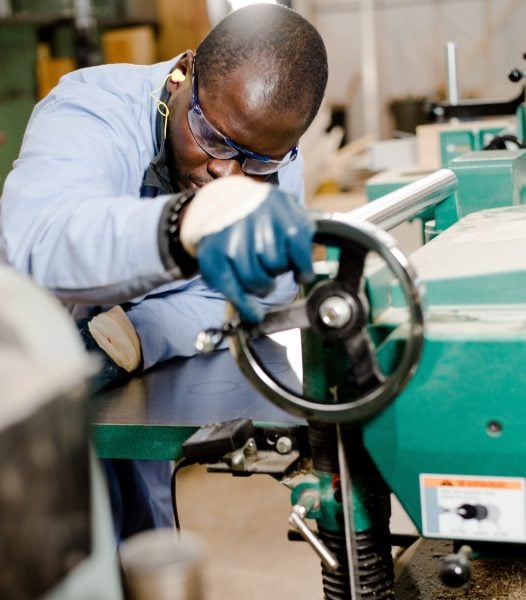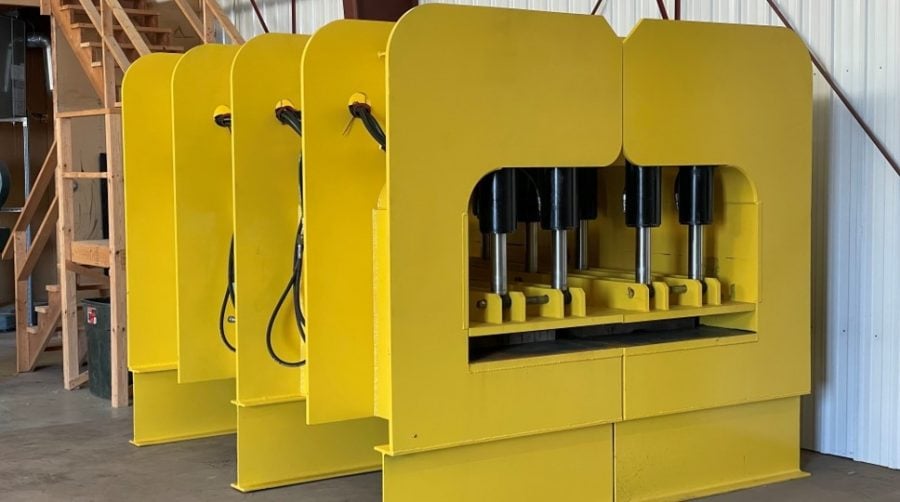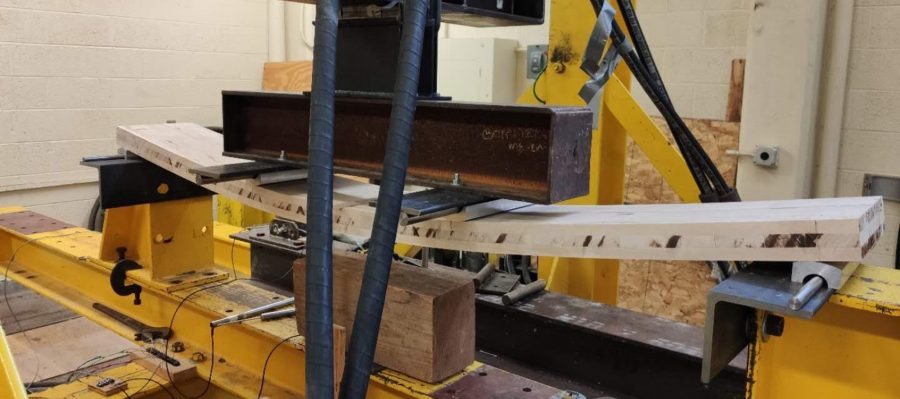A full-scale hardwood cross-laminated timber (CLT) panel testing done on sugar maple
Earlier last month, having become fascinated (well, maybe a bit obsessed) with the aesthetics and sustainability of engineered wood structures, I wrote a blog on mass timber construction. Because I work for Global Campus, I focused on the Online Timber Building Design Certificate offered by the Department of Civil and Environmental Engineering.
Afterwards, a kind and enthusiastic faculty member, Dr. Mark Rudnicki, reached out to me. Although he had enjoyed the blog, he gently reminded me that I had missed “half the story: where mass timber comes from.”
Rudnicki, based in The College of Forest Resources and Environmental Science, has many impressive forestry-related roles. He is Professor of Practice (Forest Materials), Director (Ford Center and College Forests), HotForest Enterprise Advisor, and lastly, Coordinator of Industrial Research, Innovation, and Commercialization. Rudnicki is also currently leading the Michigan Forest Biomaterials Initiative. So when he starting talking about mass timber, I immediately listened.
A few email exchanges later, I am following up on that blog by highlighting MTU’s innovative work on the development of mass timber fabrication. And the possibilities of developing a full-scale CLT facility in Michigan.
The Biomaterials initiative is an ambitious endeavor to improve the quality of life for the citizens of Michigan by moving purposefully toward a future that takes responsible yet full advantage of Michigan’s renewable resources. Biomaterials hold tremendous promise for innovative developments, uses and applications across the renewable material and energy sectors as well as re-examining traditional biomaterial sectors such as wood production and adding value to wood products.
Combining Mass Timber Research Expertise

Just as with other innovations, Michigan Tech has long lead the charge on mass timber fabrication. That is, the College of Forest Resources and Environmental Science has conducted wood product research since 1946.
And this research is transdisciplinary, too. Currently, mass timber expertise at MTU comprises a diverse team of 7 faculty members and 6 research staff. This team consists of members from the College of Forest Resources and Environmental Science, the Dept. of Civil Engineering, and the College of Computing.
Innovating CLT Products
And these experts are doing something new. Mass timber typically comes from softwood. However, for several years now, this team has been collaborating to develop new cross-laminated timber from hardwoods. Why focus on hardwoods? Because Michigan’s forests consist of approximately 70% hardwoods, many of which are of low value. And, in case you haven’t noticed, in the Upper Peninsula itself, trees vastly outnumber people. That is, of the UP’s 10.5 million acres, 84%, or 8.8 million acres, is forested land. That’s a lot of potential CLT.
The team’s first CLT panel was made from sugar maple. But they also conducted bonding performance testing on other types of Michigan hardwood. These were sugar maple, red oak, yellow birch, white ash, red maple, quaking aspen, basswood. In addition, they tested how these hardwoods bonded to two common Michigan softwood species: red pine and white pine. Their objective was investigating the potential of CLT panels comprised of both hardwood and softwood.
Further testing will be conducted through a research-scale CLT press. This press was purchased with funding from private industry and the state of Michigan. Rudnicki has big goals, too. “We are assembling a CLT fabrication lab, which will be the most capable lab outside of the West Coast.” Furthermore, his team has also raised funds for a finger jointer that can join shorter low-value boards into long boards for large CLT panels.

The manufacturing capacity of CLT in the US is currently 1/10th of the demand expected within 10 years . . . .CLT is, therefore, a prime opportunity for increasing the economic resilience of our rural communities.
Building a Market for CLT Products While Advancing Michigan’s Economy
A full-scale CLT fabrication research facility would definitely benefit Michigan. Because this facility will focus on hardwood species in Michigan, it will pave the way for both the commercialization of hardwood and the growth of local manufacturing. Thus, it would not only take advantage of abundant local resources, but also support rural jobs and communities.
A new market for hardwood is especially welcome in northern Michigan, where loggers make most of their profit on higher-grade logs, such as veneer. Because of the absence of a good market for lower-grade logs, it is often difficult to make a harvest viable and sustainable management goals achievable.
Making a sustainable CLT product from the state’s plethora of lower-value hardwoods, then, would be an environmental and economic win.
The MTU facility also aims to act as an incubator for startups interested in entering the hardwood CLT market. Building market demand for this engineered wood is a crucial first step. To do so, the team expects to produce demonstration structures that highlight the capabilities of hardwood. In other words, illustrating the strength and the beauty of hardwood structures to consumers will help to open up a market for CLT.
The potential of the CLT facility caught the attention of Senator Debbie Stabenow, who visited Michigan Tech in 2021 in support of the program.
Offering Versatile Forestry Degrees
The College of Forest Resources and Environmental Science offers several diverse degrees on the understanding and management of forests. For instance, there are MS Degrees in Forestry and Forest Ecology and Management, a PhD in Forest Science, and a Master of Forestry (professional degree).
The College also has an undergraduate degree programs in sustainable bioproducts, with a concentration in sustainable structures. This degree, which is a combination of science, business, and engineering, could be the first step in a mass timber career.
Learn more about programs offered by the College of Forest Resources and Environmental Science.
